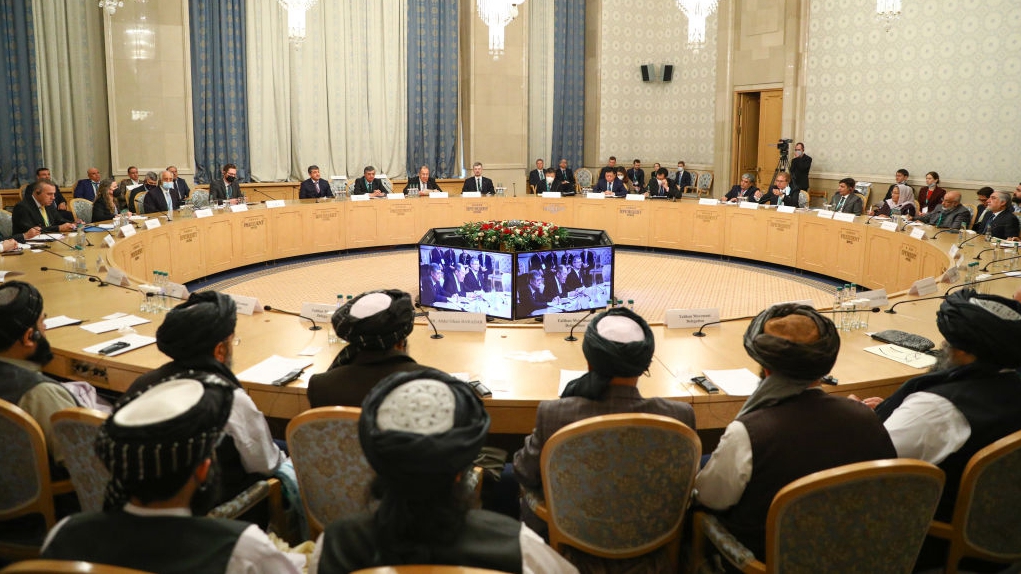
Editor's note: Andrew Korybko is a Moscow-based American political analyst. The article reflects the author's views and not necessarily those of CGTN.
The Taliban of 2021 bear very little resemblance to the Taliban of 2001, when the U.S . invaded Afghanistan to oust them, its de facto rulers, as punishment for hosting Osama bin Laden, the 9/11 mastermind. Although they're still officially regarded as terrorists by most of the world, this insurgent group has arguably been making efforts to rebrand over the past couple of years.
The Taliban's latest visit to Moscow this month can be seen as the organization's crowning diplomatic achievement, when they promised not to threaten regional countries, diplomatic missions in Afghanistan, or former U.S.-contracted Afghan interpreters if they return to power. Russia has emerged as the leader of an alternative peace track since it put historical grudges aside and decided to engage with the group.
The Taliban's trip coincided with their lightning-fast offensive across Afghanistan, which succeeded in capturing control of strategic border crossings with Tajikistan, Iran, and Turkmenistan. This dramatic development comes in the wake of the U.S. withdrawing from the Bagram Air Base, which used to be America's largest military facility in the country, on July 2.
However, the Taliban said that they don't intend to seize Kabul and will present a written peace plan during the next round of talks with Afghan Government representatives in August.
All of these moves are interconnected and strategically significant. The Taliban's capture of the border crossings greatly preempts any externally driven proxy warfare scenario, whereby some regional countries might militarily assist the government and prolong the ongoing civil war, exactly like what happened during the 1990s. This dramatically increases the odds that the Taliban will be able to convince Kabul to comply with at least some of their proposed peace terms next month.

An international conference on Afghanistan is held in Moscow, Russia, March 18, 2021. /Getty
An international conference on Afghanistan is held in Moscow, Russia, March 18, 2021. /Getty
On the diplomatic front, the Taliban have shown that they are aware of their terrible international reputation and have consequently invested much time and effort in improving it over the past couple of years. Their representatives have acquired valuable experience throughout the peace talks in Doha, Moscow and Tehran. They also promised the U.S. as part of last year's peace deal not to host any foreign terrorists.
This is extremely important for the future of Eurasian integration since Afghanistan is geostrategically positioned to serve as the connectivity crossroads of the supercontinent. The February agreement between Pakistan, Afghanistan, and Uzbekistan to construct a trilateral railway will expand the Belt & Road Initiative's flagship project, the China-Pakistan Economic Corridor, into the Central Asian countries and perhaps eventually as far as Russia and even the EU.
From the other direction, China's investments in modernizing Tajikistan's far-flung mountainous highways will facilitate the creation of a Chinese-Iranian corridor to complement the 25-year China-Iran strategic partnership deal signed in March. These crisscrossing connectivity corridors give Afghanistan unparalleled developmental potential, provided of course that whoever leads the country knows how to properly leverage this.
With all this, it seems that the Taliban of 2021 are drastically different from the Taliban of 2001. While still embracing very conservative socio-political ideals, they claim to have cut all ties with foreign terrorist groups and say they have dedicated themselves to becoming a responsible member of the international community in the event they return to power.
Should that happen, whether on their own or as part of a power-sharing deal, Afghanistan might have the chance to stabilize and finally begin to embrace its connectivity destiny.
(If you want to contribute and have specific expertise, please contact us at opinions@cgtn.com.)

